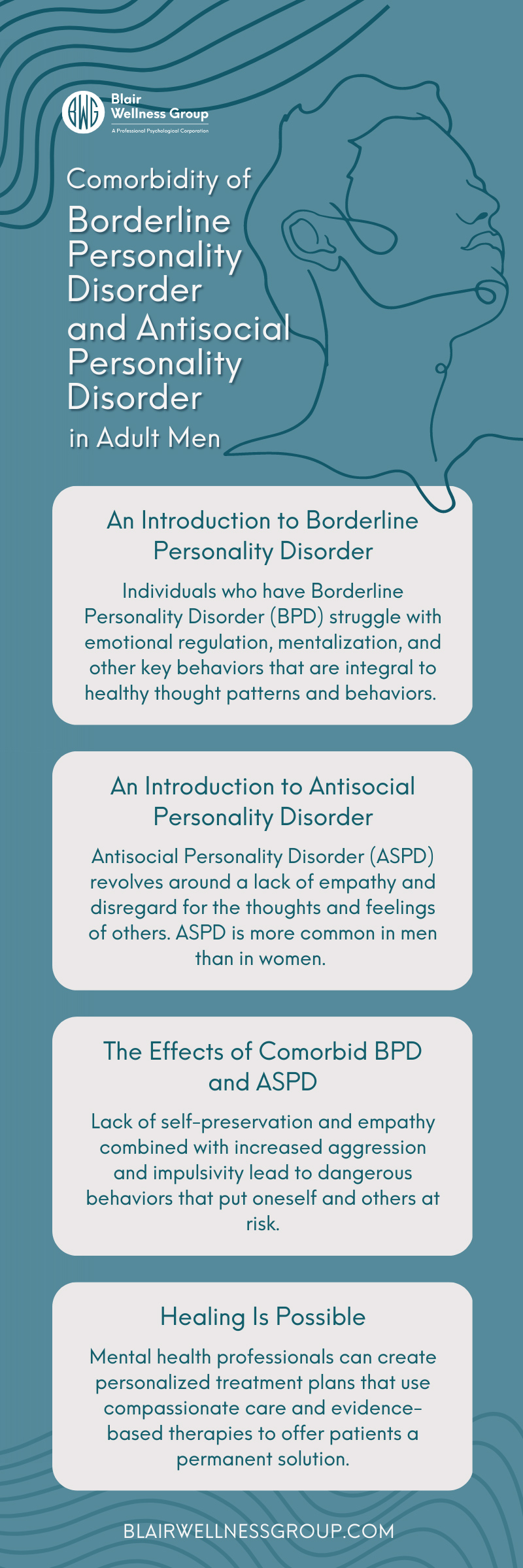Borderline Personality Disorder and Antisocial Personality Disorder belong to the same group of cluster-B Personality Disorders. These two conditions have many similarities, including potential causes, symptoms, and effects on overall well-being. As such, it is no surprise that many men who have Borderline Personality Disorder also show symptoms of Antisocial Personality Disorder and vice versa.
Comorbid disorders are a common occurrence, but they present unique challenges for patients. Understanding the link between these two Personality Disorders is a necessary step in seeking professional help, finding effective treatment, and overcoming symptoms to build a healthier life for yourself. Learn more about the comorbidity of Borderline Personality Disorder and Antisocial Personality Disorder in adult men, including the origins, etiology, and mental health treatment, with this guide.
An Introduction to Borderline Personality Disorder
Individuals who have Borderline Personality Disorder (BPD) struggle with emotional regulation, mentalization, and other key behaviors that are integral to healthy thought patterns and behaviors. BPD negatively affects emotions, behaviors, sense of self, and relationships with others.
Symptoms of BPD include intense and recurring mood swings, paranoia, and lack of self-esteem. While the symptoms of BPD are different for everyone, men are more likely to experience symptoms associated with “tougher” emotions, such as bouts of anger, recklessness, and impulsivity. Men with BPD are also more likely to indulge in attention-seeking or novelty-seeking behaviors as a way to alleviate feelings of boredom and restlessness that stem from BPD.
An Introduction to Antisocial Personality Disorder
Antisocial Personality Disorder (ASPD) revolves around a lack of empathy and disregard for the thoughts and feelings of others. ASPD is more common in men than in women. Like BPD, ASPD can lead to unstable relationships. It also creates an inflated sense of self and hinders one’s ability to follow through with responsibilities or consider the consequences of one’s actions.
People with ASPD are prone to lying, manipulation, and aggressive behavior—traits that frequently lead to disregarding or hurting others for personal gain.
Origins and Diagnostic Criteria
Mental health professionals do not know the exact origins of BPD and ASPD, but their potential causes are similar. Both disorders can stem from childhood factors such as neglect or other forms of insecure attachment to parental figures. Genetics also play a role; both BPD and ASPD are more common in individuals who have a family history of one or both disorders or another Personality Disorder.
Similarly, BPD and ASPD share many diagnostic criteria. Behaviors like aggression, impulsivity, and disregard for oneself or one’s safety can indicate both BPD and ASPD. Because of their similar symptoms, origins, and associated behaviors, BPD and ASPD often develop together or exacerbate each other.
The Effects of Comorbid BPD and ASPD
Comorbid BPD and ASPD exacerbate each other’s symptoms and create unique challenges for patients. Lack of self-preservation and empathy combined with increased aggression and impulsivity lead to dangerous behaviors that put oneself and others at risk. As a result, many men with comorbid BPD and ASPD have a history of violent acts or other criminal behaviors.
Furthermore, both BPD and ASPD are frequently comorbid with other Mental Health Disorders. Individuals with BPD and/or ASPD are also at risk for Anxiety Disorders, Major Depression, and issues with substance abuse, such as Alcohol Addiction.
Problems With Diagnosis and Treatment
One of the biggest challenges with comorbid BPD and ASPD—and with men’s Mental Health Disorders in general—is the lack of accurate diagnoses. People often assume symptoms of BPD and ASPD are the result of other Mental Health Disorders like depression or anxiety. Additionally, because of society’s view of gender, many people attribute aggression or impulsivity as typical masculine behavior rather than an indicator of a serious problem.
These issues prevent men from receiving proper diagnoses for their Personality Disorders, which in turn keeps them from seeking professional mental health treatments. This leads to the worsening of BPD and ASPD, increased severity of symptoms, and greater risk for violence, criminal offense, and other life-changing consequences.
Healing Is Possible
Despite these difficulties, there is hope for men with comorbid BPD and ASPD. Licensed Clinical Psychologists know about the comorbidity of BPD and ASPD and understand the origin, etiology, and mental health treatment of these disorders. As a result, Licensed Clinical Psychologists recognize the ways these disorders affect each other and influence related symptoms, behaviors, and mental health conditions.
With this knowledge, mental health professionals can create personalized treatment plans that use compassionate care and evidence-based therapies to offer patients a permanent solution. Effective treatments for BPD and ASPD include:
Cognitive Behavioral Treatment
Cognitive Behavioral Treatment, or CBT, gives individuals a productive space to deliberately consider their thoughts, feelings, and behaviors. Through CBT, Licensed Clinical Psychologists help patients identify maladaptive thought patterns and replace them with healthier, more productive alternatives. This helps patients with BPD and ASPD become more aware of their negative thoughts and behaviors so they can build stronger thought patterns that lead to better emotional regulation, self-control, and other constructive behaviors.
Dialectical Behavioral Treatment
Like CBT, Dialectical Behavioral Treatment (DBT) helps improve the patient’s relationship with negative behaviors and thought patterns. The goal of DBT is to use distress tolerance, emotional regulation, and other tools to build resistance to negative thought patterns, validate emotional experiences, and cultivate more productive thoughts and emotional responses.
Psychodynamic Treatment
Past experiences, such as trauma or childhood neglect, can have a significant effect on BPD and ASPD. As a result, Psychodynamic Treatment—which builds an understanding of how past experiences affect the present—can be a useful tool for treating comorbid BPD and ASPD. Through Psychodynamic Treatment, Licensed Clinical Psychologists help each patient understand how their own history informs their current symptoms and challenges. With this knowledge and awareness, patients have a better chance of successfully facing their Mental Health Disorders and overcoming symptoms.
Psychoanalytic Treatment
Mental Health Disorders make it difficult to face your own thoughts and emotions. Repressed feelings, buried memories, and other hidden experiences make this even more challenging for patients to deal with. Psychoanalytic Treatment, which revolves around the theory of psychoanalysis, is a tool Licensed Clinical Psychologists use to help patients face and explore repressed emotions and memories in a safe and productive manner. This helps individuals with BPD and ASPD get to the root of their negative thoughts and behaviors so they can overcome maladaptive patterns and heal from their symptoms.
Blair Wellness Group has experience helping patients with BPD and ASPD. With a clear understanding of both disorders and how they influence each other, Dr. Blair can successfully treat patients with compassion and expertise. If you are looking for effective treatment from a Licensed Clinical Psychologist in Irvine, turn to the team at Blair Wellness Group.

Dr. Cassidy Blair is a renowned Licensed Clinical Psychologist and trusted Performance Coach who specializes in providing Concierge-Psychological Care and Executive Coaching for high-achieving professionals. With a deep understanding of the unique challenges faced by CEOs, executives, entrepreneurs, and leaders, Dr. Blair offers tailored, confidential care designed to foster emotional well-being, personal growth, and professional excellence. Her clientele values her discretion, clinical expertise, and emotionally intelligent approach to navigating complex personal and professional dynamics.
- This author does not have any more posts.








